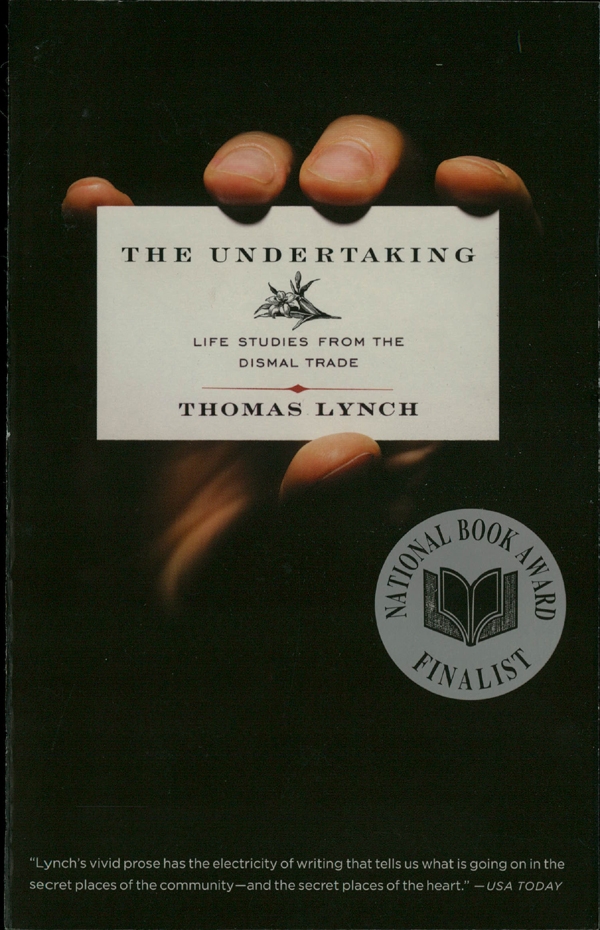The Undertaking
Authors: Thomas Lynch



“[Lynch] brings the lessons of death to life, and turns life and death into art.”
—
Time Out New York
“The year in literature may not produce a better opening line—‘Every year I bury a couple hundred of my townspeople’—and the rest of
The Undertaking
lives
up to that earthshaking start. … A memoir that is stand-out superb even in an era thick with first personages.”
—
Esquire
“Lynch’s essays are consistently humane and observant of the tragic, humorous, and occasionally startling vagaries of human life…. Highly recommended reading for fans of poetry, Ireland, funeral and cultural customs, or anything else. More than a study of ‘the dismal trade,’
it is a long view of what it means to be human.”
—
Detroit Free Press
“[An] unusual and affecting book. Lynch writes beautifully and affectingly…. Each of the book’s chapters … enchants and instructs while enlightening us in the ways of living, dying, and most important, in Lynch’s anything-but-dismal view, loving.”
—
Elle
“He is able to take us inside the palpable business of blood, tears,
and the final verse of life in a manner that is almost shocking in the relief it delivers. … [A] fine, sensible, and wise book.”
—
Boston Sunday Globe
“[Lynch] devotes most of his finely composed pages to gently humorous and unabashedly affectionate portraits of the people he loves.… [A] collection of powerful and cadenced essays.”
—
Chicago Tribune
“Remarkable … [Lynch] writes in a disarmingly
wry and tender way.”
—
Utne Reader

Skating with Heather Grace
Grimalkin & Other Poems

Life Studies from the Dismal Trade


This book is for Dan, Pat, Tim, Mary, Julie, Eddie, Chris, and Brigid

In Memory of Our Parents Rosemary O’Hara and Edward Joseph Lynch
Now there is no more catching one’s own eye in the mirror,
The poor we no longer have with us. Our calm hearts strike only the hour,
and God, as promised, proves to be mercy clothed in light.
—J
ANE
K
ENYON
1948-1995

Sunt lacrimae rerum et mentem mortalia tangunt.
—V
IRGIL
70-19
B.C.

And I swear that I don’t have a gun. No I don’t have a gun.
—K
URT
D. C
OBAIN
1967-1994

I chose the Vermont Hardwood, dark and shiny. At calling hours we said that her mouth
was wrong. It was a comfort, I suppose.
—D
ONALD
H
ALL

T
hanks are due to John Lanchester of
The London Review of Books
and Alexandra Ringe of
Harper’s
for the early publication of several of the essays that appear in this collection. To Gordon Lish, who published my first poems and essays, I owe permanent thanks. As I do to Jill
Bialosky at W. W. Norton whose trust in and efforts on behalf of this manuscript have brought it into being.
I shall always be in arrears in my indebtedness to Robin Robertson at Jonathan Cape, well met in Dublin in the Spring of 1989, who has edited my poems and who first suggested a book of this type over raw fish in London a few years ago.
Likewise, I am grateful to my agent, Richard P. McDonough,
for his championship of this manuscript and his loyalty and friendship.
Thanks also to the men and women at Lynch & Sons Funeral Directors with whom I work. Their dedication and professionalism have afforded me the time to complete this book. Especial thanks are due to my brother Edward, whose duties have redoubled in my absences. He is, like the man he was named for, a true caregiver, a good
and decent man. I am grateful, also, to my neighbors and friends in Highland Township and Milford, Michigan, for entrusting to our family, for nearly twenty-five years now, the care of their families in difficult times. By sharing with me the details of their lives and deaths, they have made me aware of just how precious we are
to one another. In the preparation of these essays, I have been keenly
aware of the obligation to respect their privacy. Thus, some of the events and characters recorded here are composites, cominglings—truths renamed, reshaped, refaced, but finally told, in ways that protect the trust they’ve given me.
For related reasons, I am ever in the debt of writers and friends, Irish, English, Scots, and Americans, who have let me write, sometimes fast and loose, about our
friendships.
I am thankful to Pat Lynch, Mary Howell, Melissa Weisberg, Audrey Kowalski, and Fr. Matthew Lawrence, each of whom read and gave valuable commentary on this manuscript in its making.
To Karen O’Connor of WGBH in Boston and the office of the Oakland County Medical Examiner, I am indebted for material mentioned in
Uncle Eddie, Inc.
Also, to Ron Willis, cemetery sexton and thinking
man, I owe thanks for his willingness and ability to take the other side of any argument, without which my own would never approach clarity.
To my daughter, Heather Grace, and my sons Tom, Mike, and Sean, I am ever beholden for their patience, enduring, as they do, draft after draft of a work in progress.
No vocabulary of thanks and praise includes the words sufficient for what I owe to Mary
Tata who has known this text from the very first.
